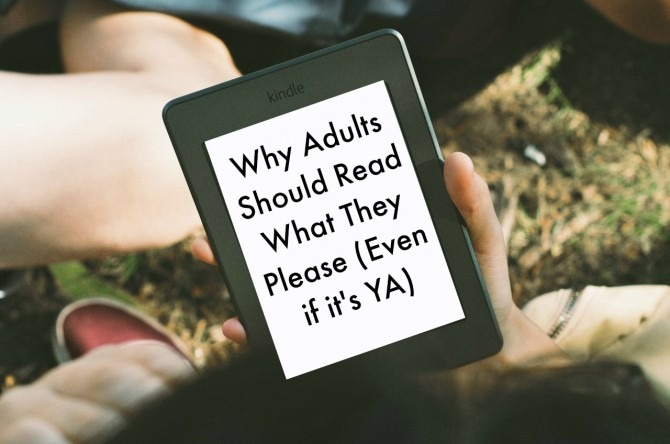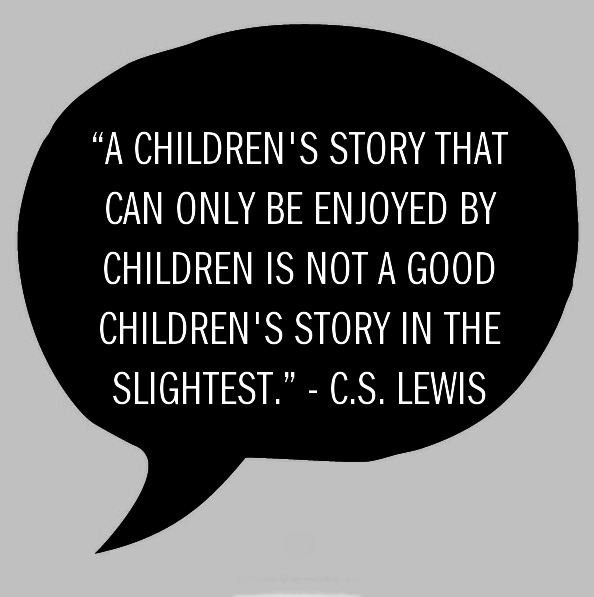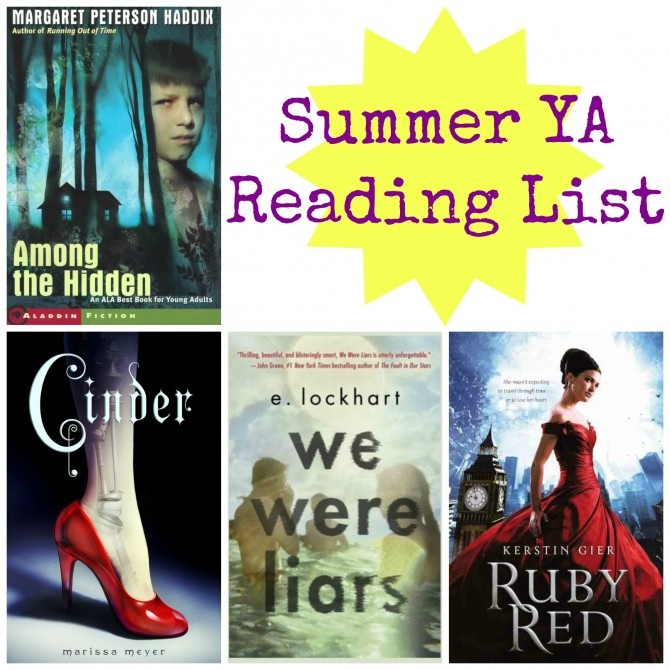Earlier this month, journalist Ruth Graham ignited a firestorm among the literary community with her rant against young adult fiction. In an article entitled: “Against YA: Yes, adults should be embarrassed to read young adult books,” Graham claims that adults should feel embarrassed when reading books written for children, especially when YA books are replacing literary fiction.
Readers everywhere were quick to voice their opinions: many rallied behind Graham, while others were quick to defend their beloved YA. I’m not an avid YA reader, but I have to say that I am firmly in the pro-YA/anti-Graham camp. It’s true that more and more adults are finding enjoyment in books targeted toward a younger audience, but I don’t know that YA is the blight against literature that Graham makes it out to be. Here are just a few of the reasons I believe that adults can – and, in some instances, should – read whatever they please . . . including YA.
1. You should read what you want to read.
There is a growing body of evidence supporting the idea that the best way for children to develop into strong readers with a lifelong love for reading is to expose them to as many books as possible in their formative years. The quality and content of these books isn’t as important as the fact that they are reading; and when children are given choices regarding what they read, they do a lot of it . . . and then they find out they are good at it, and they enjoy it!
I believe the same holds true for adults. Most of the adults I know who do not consider themselves “readers” cite a lack of time as their excuse for letting their books sit on the shelves, but I believe that if they truly enjoyed reading, they would make time for it. Unfortunately, many adults believe there are certain books they “should” read, and if those books are not enjoyable to them, they forgo reading altogether.
My response to this is: forget about the should’s and shouldnt’s of reading, and read what you want! And if the book you choose to read happens to be a YA book, by all means, enjoy your book – and don’t be embarrassed by it!
2. A good story has universal appeal.
In her article, Graham writes “Life is so short, and the list of truly great books for adults is so long.” I agree that there are many great books out there – more than I will ever be able to read in my lifetime – but I disagree that all of the “truly great books” are those written for adults. Some of my all-time favorite reads (among them I Love You Forever and the Harry Potter series) were designed for much younger readers, but that does not keep them from being classics. And we all know that not every book for adults is a literary masterpiece.
Whether its target audience is a preschooler or a senior citizen, a truly good book will appeal to more than just its target demographic. After all, the YA genre is simply a marketing distinction, and I refuse to confine my literary selections to a label arbitrarily selected by a marketing committee.
3. There are many reasons to read a book.
I consider myself a fairly well-rounded reader, and not every book I select is designed to fulfill the same need. Some books I read for enjoyment and escapism. Other books are selected for their educational value, or their literary merit. I read memoirs so that I can experience the world through another person’s eyes, and I read historical fiction so I can learn about history while simultaneously being entertained. Sometimes I pick up a book because everyone else is reading it, and I simply want to know what all the fuss is about!
One of my favorite reasons for reading a particular book is so that I can connect with others. When I was in elementary school, my dad read through several American Girl books so that he could share in my reading experience; for a bookworm like myself, that was one of the greatest expressions of love he could have shown me, and it revealed to me the powerful connections that can be formed through books. Today, I often read books suggested by friends and family members – even if they are not books I would generally select on my own – because I cherish the bonding that can result from a shared literary experience.
As a teacher, I like to stay abreast of the books my students are reading. It helps me to understand them a bit better, and I’ve found that a teacher who likes to read “kids books” can spark some wonderful conversations, and even inspire reluctant readers. This fall I will be taking on the (frightening) role of a Jr. High Language Arts teacher. I know that my students will be reading quite a few YA novels this year; in fact, I am requiring it of them. In order to connect with my students, and serve as a positive reading role model, I am personally delving deeper into the YA genre. My good friend Deanna (who happens to be my favorite librarian) helped me put together a recommended reading list for my students, and though I won’t be able to read every book on the list before the school year begins, I’m hoping to at least make a dent. Here are a few of the books on my summer reading list.
Among the Hidden, by Margaret Peterson Haddix (Book 1 in the Shadow Children Series) – This book is about a forbidden third child forced to live in hiding in a society that only allows two children per household. My class this fall is going to have a society theme, so this book should fit in perfectly.
Cinder, by Marissa Meyer (Book 1 in the Lunar Chronicles Series) – I have to admit that this book’s cover turned me off to it at first (shallow, I know. . . ), but many bloggers have written favorably about this series that takes place in a futuristic China, so I’m willing to give it a try.
We Were Liars, by E. Lockhart – This novel about a teenager who suffered an amnesia-inducing accident is being touted as the YA book of the summer. I’ve heard that the less you know about this book before you read it, the better, and I’m always game for some serious plot twists!
Ruby Red, by Kerstin Gier (Book 1 of the Ruby Red Trilogy) – I’ve already begun listening to the audio version of this book about a girl who discovers she has a gene that enables her to travel through time. Halfway through the book, I am suitably impressed by the witty writing and riveting story. This is one YA book I will be happy to recommend to my students.
+ + + + +
What are your thoughts on the YA genre: Do you love it or hate it, or are you completely indifferent? Do you believe adults should be embarrassed about reading YA novels? Do you have any more YA suggestions for me? Share your thoughts with me in the comments!



[…] audiobook docket continues to be filled with YA books as I prepare for the Jr. High literature class I’ll be teaching this fall. This month I discovered […]
[…] part of my mission to read as many YA novels as possible this summer, I picked up the audio version of We Were Liars from my library. Hailed by many as the best YA […]
Well, as a middle school librarian, I have no idea what that Graham lady is thinking! No matter the targeted age market, I firmly believe that you can take away some life lesson or observation from every story. If anyone wants to connect with teens or tweens these days, they’re going to have to grab a YA book and see what all the rage is about (i.e. drama, angst, love, survival, betrayal, jealously–all those things we as adults have learned aren’t so bad after all. And not that every YA book is actually worth reading, but there are some really good ones out there that I don’t want to miss – I just have to wade through gargantuan amounts of dystopian lit and vampires to get to them). Anyway, I might be a bit biased since I live and breathe YA books these days, and I absolutely love talking to the kids about what’s popular and what they like and who’s a good author and “oh my gosh, Mrs. Westphal, you HAVE to read this,” but I would be totally proud to whip out a copy of Delirium in a crowded restaurant and see how many adults approached me about it (about as many as kids, I would guess). The only books that I ever try and convince kids and adults NOT to read is the Twilight series, I mean, those are a few thousand pages of my life that I will never get back.
I love your response, Deanna. I knew you’d have a word or two to say about this topic! I’m with you on all of it – including Twilight, those books are horrible. But then, I’ve slugged through my fair share of terrible “adult” books too. And like you said, even the worst of books have *some* takeaway – even if the takeaway is about how NOT to write!